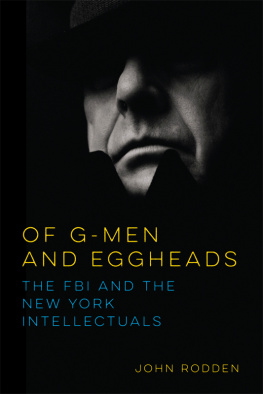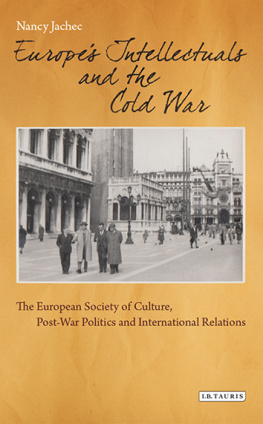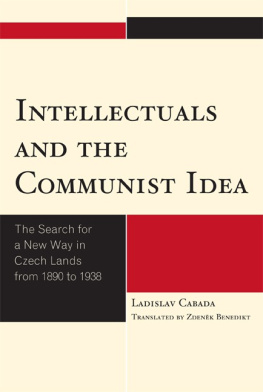OF G-MEN
AND EGGHEADS
published with aid of grant
Figure Foundation
reading the meaning of reader
OF G-MEN
AND EGGHEADS
THE FBI AND THE
NEW YORK
INTELLECTUALS
JOHN RODDEN
2017 by the Board of Trustees
of the University of Illinois
All rights reserved
1 2 3 4 5 C P 5 4 3 2 1
 This book is printed on acid-free paper.
This book is printed on acid-free paper.
Cataloging data available from the Library of Congress
ISBN 978-0-252-04047-4 (hardcover)
ISBN 978-0-252-08194-1 (paperback)
ISBN 978-0-252-09890-1 (e-book)
CONTENTS
PREFACE
When I first broached the topic of this book to a friend years ago, a onetime Partisan Review editor who knew the subjects of this book personally, he registered surprise that the FBI had kept such distinguished critics under surveillance for quite some length of time. He had doubted the possibility, he said, for two reasons: first, because their influence was limited to a small circle of other intellectuals; second, and more important, because after their early, sometimes brief involvements with the Left, each figure spotlighted in my triptychLionel Trilling, Dwight Macdonald, and Irving Howebecame a fierce anti-Stalinist and anti-communist. (So too did Alfred Kazin, the fourth Partisan Review subject discussed in passing here.)
These circumstances turn the G-mens doggedly insistent if sporadic pursuit of this intellectual quartet into a bizarre, risible paradox and point to the twin themes of this book. First, the Bureau had a huge blind spot in dealing with the American Left and had trouble making even obvious distinctions. Second, FBI agents had an equally large mental block in dealing with that strange species, the intellectual. Oddly, although agents occasionally conducted interviews, did physical surveillance, and clipped journalistic pieces about a suspectsometimes assiduously combing press reports for tidbits about which political meetings he attended or which protest letters she signedrarely did they do the obvious, which was to read what these writers actually wrote. That oversight accounts partly for a comic aspect to the pattern of amusing mix-ups and ludicrous misunderstandings that recur in the FBI files. More significantly, some real issues also emerge about domestic espionage during peacetime, especially concerning Americans whose main activity is the free expression of opinion rather than the seditious organization of revolution.
I have sought to take a balanced view of the surveillance issue, neither condemning it root and branch as invariably a violation of privacy and individual rights nor advocating wide latitude for internal spying on security grounds. I also do not mean to inflate the public significance of the intellectuals featured in this book or to exaggerate their individual or collective importance to the FBI. Each was under surveillance only intermittently, for relatively short periods of time, and the FBI eventually lost interest in all of them. For example, after years of reports leading to a dossier of some seven hundred pages, J. Edgar Hoover could not even remember who Macdonald was. Moreover, the periodic security checks of Howe and his family represented a dishonorable affront rather than a campaign of intimidation or persecution, as he would have acknowledged. And apart from his acquaintance with Whittaker Chambers, Trilling was less radical and of less concern to the FBI than either Macdonald or Howe, even though both Lionel and his wife, Diana, were briefly members of a communist front organization. Yet in the climate of fear and paranoia that gripped the Feds, especially throughout the Cold War era during the middle decades of the twentieth century, even Trilling accumulated a substantial file. Nonetheless, these case histories, particularly the Macdonald saga and its misadventures, prove absorbing as an expos of FBI illusions, as a revealing spectacle of sophomoric blundering, or simply for the sheer incongruity of observing luftmenschen become the object of clumsy and misplaced official suspicion.
All this adds further interest to the book in three ways. First, the lives and works of these men are intrinsically engaging, even from this unlikely angle, since they were among the leading men of American letters of the mid-twentieth century. Second, these investigations were appallingly inept and misplaced, though they fell far short of evoking the atmosphere of a police state, as the men investigated well knew. Third, each case history highlights, perhaps surprisingly, a dramatic slice of history in which these men had cameo rolesthe Hiss-Chambers trials (Trilling), the Smith Act and Red Scare (Howe), and the star-crossed White House Festival of the Arts (Macdonald). In this last case, a gala event held in June 1965 that witnessed a Vietnam-era gathering of cultural figures by the Johnson administration that was never tried again, I argue that this fiasco marks a Dreyfus-like watershed moment in American literary history, representing the definitive end of the tacit tradition of mutual cordiality between the art world and the state and heralding what has since indeed become a seemingly permanent alienation between liberal-Left intellectuals and power in America.
In short, Of G-Men and Eggheads: The FBI and the New York Intellectuals sheds light on Washingtons official attitude toward American intellectuals and discloses above all the intelligence services overwhelming ignorance of yet wariness toward leftist groups. The surveillance was modest compared to the vast amount of FBI spying during the 1950s and 1960s on New Left leaders, student activists, and major American authors such as Steinbeck and Hemingway. The Bureaus monitoring nevertheless possesses significance and value, not only because it is so unexpected but also because these figures were so firmly and outspokenly anti-communist. It shows us that the G-men could not distinguish radicals from Reds, ex-radicals from radicals, or intellectuals from activists.
Ironically, when it came to investigating intellectuals, the intelligence services proved utterly unintelligent. For all the interviews recorded, all the dossiers assembled, and all the miles and man-hours logged in pursuit of these particular intellectuals and others like them, the FBI failed to grasp countless elementary biographical and political facts that were readily and publicly available. If only an agent or two had sat still and done a bit of serious reading.
Yes, if only he had read some portion of their work.
OF G-MEN
AND EGGHEADS
PROLOGUE
THE TRADITION OF THE NEW
Why should we care about this history? Is it a mere curio for scholars and specialists? Or is it significant and pertinent in todays post-communist, digital, globalized age? Apart from the stories that the following chapters tell and the value of this history as a (however imperfect and impartial) record of what happened, one answer is that the past is not an entirely foreign countryand, in fact, is by no means even passed. For the new century in which we live was shaped by the Cold War era and can only be fully appreciated by understanding the developments of those decades. That history established the current conditionsnot only political and social but also psychologicalthat govern the choices facing the United States and the rest of the world today.








 This book is printed on acid-free paper.
This book is printed on acid-free paper.